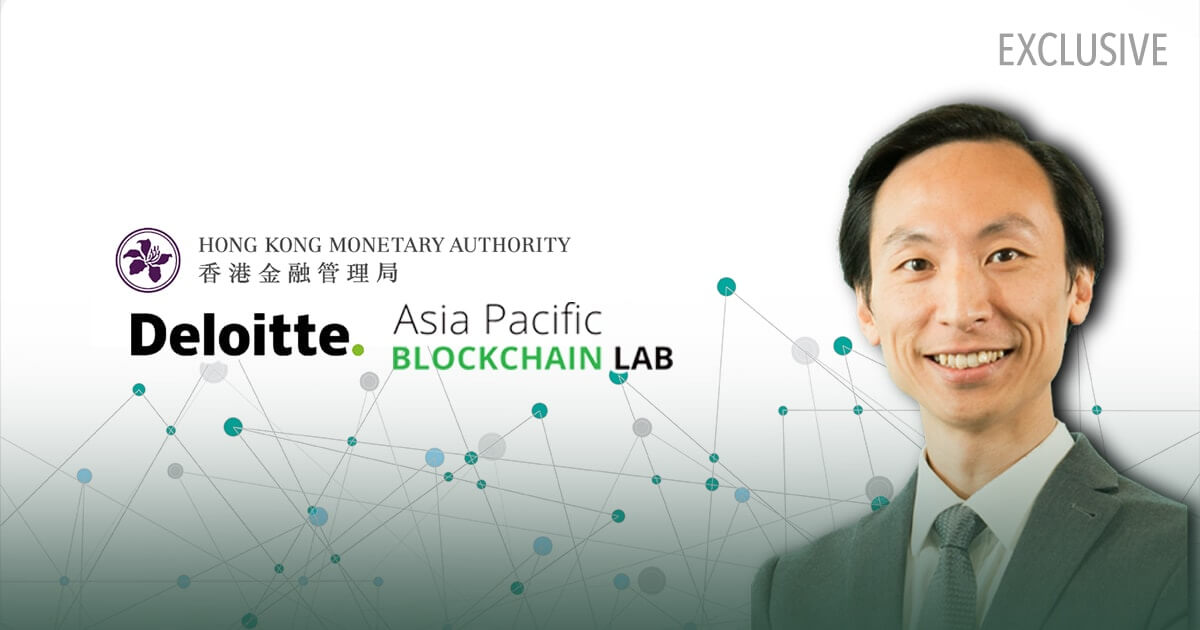Exclusive: Deloitte Blockchain Lab on the Three Areas of Collaborations with HKMA
Matthew Lam Aug 06, 2019 10:15
We were delighted to interview Dr. Paul Sin, leader of the Deloitte Asia Pacific Blockchain Lab, who shared with us its development goals and the collaborations with HKMA across the Greater Bay Area and Europe.

The Hong Kong Monetary Authority (HKMA) started exploring blockchain technology with the whitepaper on distributed ledger technology (DLT) in Nov 2016. Since then, the HKMA has been actively leveraging blockchain into trade finance including eTradeConnect, Global Trade Connectivity Network, and we.trade. What is the role of Deloitte Blockchain Lab in these initiatives?
We were delighted to interview Dr. Paul Sin, leader of the Deloitte Asia Pacific Blockchain Lab, who shared with us its development goals and the collaborations with HKMA across the Greater Bay Area and Europe.

What is Deloitte Blockchain Lab and what values does it aim to bring to enterprises?
The Deloitte Asia Pacific Blockchain Lab has been implementing blockchain solutions for enterprises across the region. Apart from the Asia Pacific Blockchain Lab, Deloitte has another two centers, one in New York and one in Dublin, covering America and Europe, the Middle East, and Africa (EMEA) respectively.
Our Lab uses mostly permissioned blockchain technology for cross-organizational and cross-border B2B data synchronization. Due to regulatory constraints in the region, we do not have a lot of public blockchain or crypto platform implementations. However, other functions in Deloitte including audit, tax advisory, financial advisory, and risk advisory have been supporting Initial Coin Offerings (ICOs), Security Token Offerings (STOs), and crypto audit in general from an assurance and cybersecurity perspective.
What goals or projects have been established at the Deloitte Asia Pacific Blockchain Lab since the collaboration with the HKMA and the twelve leading banks in Hong Kong?
In Hong Kong and Asian countries in general, small to medium enterprises (SME) have only a 20% chance of obtaining financing. Banks reject their loan applications because of identity theft, forged documents, and huge potential losses due to duplicated financing. In the past, SMEs would make a purchase order and go to multiple banks for financing, and bolt with the money. There is also no reliable way to validate buyers who can issue purchasing orders. Banks will need to get KYC information on a buyer to prove the buyer who issued the purchase order is authentic and also make sure they have the capability to pay the invoice after the goods are delivered.
Once all these aspects are validated, then the banks will feel more comfortable financing SMEs. To overcome the challenge of duplicate financing, the only way available before blockchain was to create a credit bureau with a centralized database under which all banks will be asked to submit sensitive information and trade documents to a central party. Blockchain becomes the perfect platform because it can synchronize data to all participants in the ecosystem without risking their privacy. This is the reason why the 12 banks in Hong Kong joined together with the HKMA to develop eTradeConnect, which is a blockchain-based trade finance platform.
What are the top projects that Deloitte Blockchain Lab has been working on most recently?
We have done work on a number of projects, including bancassurance in the Greater Bay Area, traceability in Hong Kong, cross-border digital identity and multi-merchant loyalty programs.
Are most of your clients mainly from the Greater Bay Area or worldwide?
For the Asia Pacific, a lot of projects are regional. For example, the HKMA signed a Memorandum of Understanding (MoU) with Singapore to jointly develop the Global Trade Connectivity Network. This project is a cross-border infrastructure based on blockchain technology to digitize trade and trade finance. These kinds of platforms all have a regional focus.
The HKMA has also signed an MoU with we.trade, which is based in Europe, to support cross-regional trade finance. Many of the participants in those ecosystems are multinational companies, and a lot of value comes from cross-organization or cross border collaborations. This is also why the Chinese government also believes blockchain is a strategic initiative because it will be an enabler for the Belt and Road Initiative and the Greater Bay Area. This sheds light on why most governments, regulators, and central banks are adopting blockchain at the moment.
Do you also have some companies working on blockchain in the Belt and Road Initiative?
Blockchain technology is mostly facilitating supply chain and trade finance, therefore it will be closely related to those initiatives.
Image source: Shutterstock.jpg)